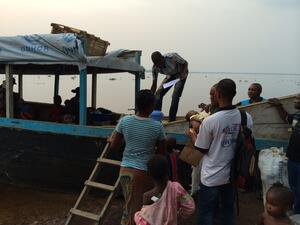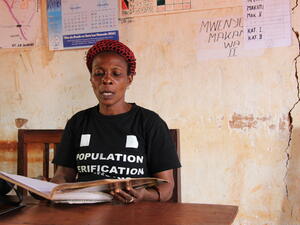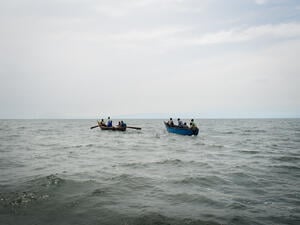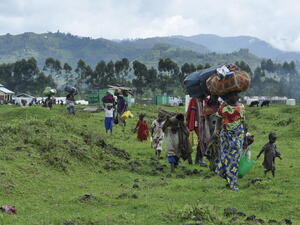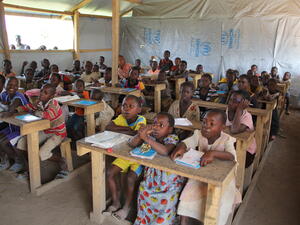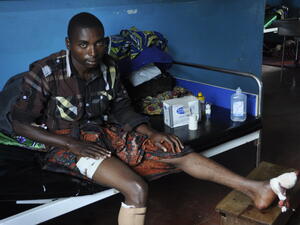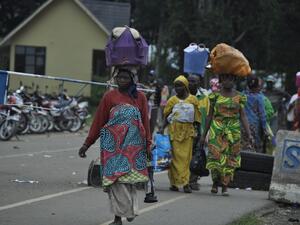Fresh fighting triggers new Congolese refugee inflow to Uganda
Fresh fighting triggers new Congolese refugee inflow to Uganda

Newly arrived refugees at the Nyakabande Transit Centre in south-west Uganda. Many were able to bring their possessions with them when they fled their homes.
NYAKABANDE TRANSIT CENTRE, Uganda, November 4 (UNHCR) - Fresh fighting has erupted between Congolese government troops and rebel fighters in North Kivu province, forcing an estimated 10,000 people to flee in panic across the border into south-west Uganda's Kisoro district.
UNHCR staff in Uganda reported shelling early Monday morning of the border crossing town of Bunagana, which troops of the Democratic Republic of the Congo (DRC) had seized from the rebel M23 movement last Wednesday. As the shelling increased some missiles landed in Uganda and many locals moved to safer areas. Refugees reported seeing people dead.
Around 10,000 people are estimated by Ugandan authorities to have fled into Uganda - running along the roads in fear and panic, with some bringing possessions and livestock and others carrying nothing. The fighting was believed to be about five kilometres away and later on Monday, security officials said, Bunagana was empty of civilians.
One refugee in Nyakabande Transit Centre, some 20 kilometres from the border, said he had already been displaced once with his wife and nine children from the North Kivu town of Rutshuru, which government troops captured last week from the M23. "There were many injured who crossed [at Bunagana after the fighting began], but we left all the dead in Congo," said Bahati, aged 41.
Another man, who asked not to be named, said he was from Bunagana on the DRC side and had already crossed into Uganda when the latest bombardment began. "I was staying at the border and I began running," he said, adding that he now wanted to join his wife and children far to the north in the Rwamwanja refugee settlement in Uganda.
UNHCR began moving refugees away from the border area to the Nyakabande Transit Centre on Monday morning. By evening, the refugee agency had moved more than 3,500 people to Nyakabande, breaking the previous record of 1,921 for a single day. This brings the total in the centre to more than 8,000 people.
The refugees are being collected at a point five kms from the border, because it is too dangerous at Bunagana. Many others were walking to Nyakabande from the border. Most of the new arrivals are children, and at least 105 were unaccompanied, of whom 30 were reunited with family. The unaccompanied children are being sheltered in separate tents and given extra items.
UNHCR is providing those arriving at Nyakabande with shelter, emergency relief items and food supplied by the World Food Programme. Many of the new arrivals are suffering from dehydration and diarrhoea. UNHCR health partner, Medical Teams International (MTI), has set up an oral rehydration tent at the registration point where refugees arrive and all new arrivals are screened by medical staff.
UNHCR has enough emergency relief items for a population of 10,000. In addition to 216 family tents at Nyakabande, there are 11 communal shelters which can each hold about 300 people and a 12th is being erected to accommodate 600 people. However, supplying water to the transit centre remains a challenge as water pressure in the district is very low, and UNHCR is working to connect an additional pipeline.
There are also shortages in surgical supplies due to the high number of injured. UNHCR's partner MTI on Monday picked up 16 refugees and one Ugandan suffering from minor injuries from shell fragments and took them to Kisoro Hospital. MTI has also provided the hospital with extra medical supplies, but more is needed as well as medical staff.
The latest fighting comes barely a week after the government troops attacked M23 positions before taking the rebel movement's strongholds in North Kivu province and pushing them back to the hills just south of Bunagana. That fighting forced about 10,000 people across the border at Bunagana, but many had started returning since the middle of last week. At the weekend, the M23 was talking about reopening peace talks in the Uganda capital, Kampala.
So far this year UNHCR has assisted more than 56,000 Congolese arriving from eastern provinces of the DRC. In Uganda, Congolese refugees make up 65 per cent of the entire refugee population of 234,000 and the majority of these have arrived in the last three years.
By Lucy Beck in Bunagana, Uganda

